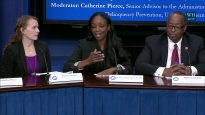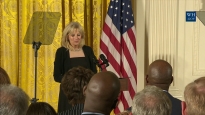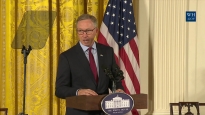Weekly Address: Calling for Limited Military Action in Syria
September 07, 2013 | 2:56 | Public Domain
In his weekly address, President Obama makes the case for limited and targeted military action to hold the Assad regime accountable for its violation of international norms prohibiting the use of chemical weapons.
Weekly Address: Calling for Limited Military Action in Syria
WASHINGTON, DC — In his weekly address, President Obama makes the case for limited and targeted military action to hold the Assad regime accountable for its violation of international norms prohibiting the use of chemical weapons. The President realizes the American people are weary after a decade of war, which is why U.S. action would not include U.S. boots on the ground. Instead, the President has put forward a proposed authorization that is focused on his clearly stated objectives – preventing and deterring the use and proliferation of chemical weapons (CW) within, to, or from Syria, degrading the Assad regime’s capacity to carry out future CW attacks, and deterring this behavior in others who would otherwise feel emboldened to use such weapons. The President acknowledged it is not a decision he made lightly, but failing to respond to such actions poses a serious threat to our national security.
The audio of the address and video of the address will be available online at www.whitehouse.gov at 6:00 a.m. ET, September 7, 2013.
Remarks of President Barack Obama
Weekly Address
The White House
September 7, 2013
Almost three weeks ago in Syria, more than 1,000 innocent people – including hundreds of children – were murdered in the worst chemical weapons attack of the 21st century. And the United States has presented a powerful case to the world that the Syrian government was responsible for this horrific attack on its own people.
This was not only a direct attack on human dignity; it is a serious threat to our national security. There’s a reason governments representing 98 percent of the world’s people have agreed to ban the use of chemical weapons. Not only because they cause death and destruction in the most indiscriminate and inhumane way possible – but because they can also fall into the hands of terrorist groups who wish to do us harm.
That’s why, last weekend, I announced that, as Commander in Chief, I decided that the United States should take military action against the Syrian regime. This is not a decision I made lightly. Deciding to use military force is the most solemn decision we can make as a nation.
As the leader of the world’s oldest Constitutional democracy, I also know that our country will be stronger if we act together, and our actions will be more effective. That’s why I asked Members of Congress to debate this issue and vote on authorizing the use of force.
What we’re talking about is not an open-ended intervention. This would not be another Iraq or Afghanistan. There would be no American boots on the ground. Any action we take would be limited, both in time and scope – designed to deter the Syrian government from gassing its own people again and degrade its ability to do so.
I know that the American people are weary after a decade of war, even as the war in Iraq has ended, and the war in Afghanistan is winding down. That’s why we’re not putting our troops in the middle of somebody else’s war.
But we are the United States of America. We cannot turn a blind eye to images like the ones we’ve seen out of Syria. Failing to respond to this outrageous attack would increase the risk that chemical weapons could be used again; that they would fall into the hands of terrorists who might use them against us, and it would send a horrible signal to other nations that there would be no consequences for their use of these weapons. All of which would pose a serious threat to our national security.
That’s why we can’t ignore chemical weapons attacks like this one – even if they happen halfway around the world. And that’s why I call on Members of Congress, from both parties, to come together and stand up for the kind of world we want to live in; the kind of world we want to leave our children and future generations.
Thank you.
|
November 15, 2016
|
November 15, 2016
|
November 14, 2016
|
November 14, 2016
|
|
November 14, 2016
|
November 14, 2016
|
November 14, 2016
|
November 14, 2016
|
- &lsaquo previous
- …
- 8
- 9
- 10
- 11
- 12
- 13
- 14
- 15
- 16
- …
- next &rsaquo







